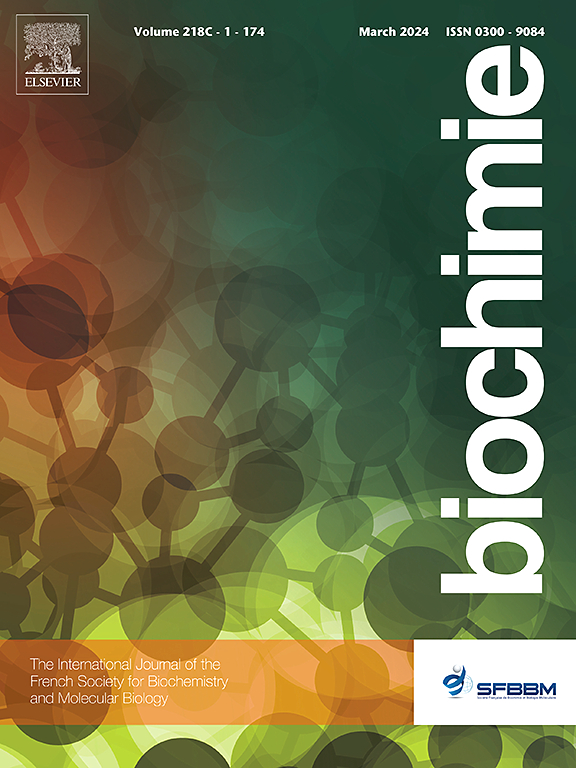咖啡因调节大肠癌细胞中免疫蛋白酶体的活性和含量。
IF 3
3区 生物学
Q2 BIOCHEMISTRY & MOLECULAR BIOLOGY
引用次数: 0
摘要
蛋白酶体水解大多数细胞内蛋白质。免疫蛋白酶体是一种与炎症、癌症和自身免疫性疾病有关的蛋白酶体。调节免疫蛋白酶体的活性是一种很有前途的方法来对抗几种病理。使用先前获得的结直肠癌报告细胞系,我们测试了包括布洛芬、乙酰水杨酸、维生素C、咖啡因等常用化合物如何影响免疫蛋白酶体的表达。流式细胞术、qPCR和Western blot检测免疫蛋白酶体亚基表达。用荧光底物和活性探针检测蛋白酶体活性。转录组分析用于鉴定基因表达变化的模式。有趣的是,咖啡因是唯一一种刺激免疫蛋白酶体数量适度减少的药物。咖啡因的作用因细胞系而异,并且随着治疗时间的延长而变得更强。细胞中免疫蛋白酶体含量的降低与免疫蛋白酶体亚基、编码Nrf3转录因子和PAC4蛋白酶体组装伴侣的基因表达的降低以及氧化应激水平的降低相一致。咖啡因不影响免疫蛋白酶体的自噬降解。获得的结果揭示了咖啡因的新生物学效应,我们的数据可能有助于优化现有的和开发治疗结直肠癌和一些自身免疫性疾病的新策略。本文章由计算机程序翻译,如有差异,请以英文原文为准。
Caffeine modulates immunoproteasome activity and content in colorectal adenocarcinoma cells
Proteasomes hydrolyze most intracellular proteins. Immunoproteasome is a form of proteasome implicated in inflammation, cancer and autoimmune diseases. Modulation of immunoproteasome activity is a promising approach against several pathologies. Using previously obtained reporter colorectal cancer cell lines, we tested how commonly used compounds including ibuprofen, acetylsalicylic acid, vitamin C, caffeine and others, affect immunoproteasome expression. Flow cytometry, qPCR and Western blot were used to evaluate immunoproteasome subunit expression. Proteasome activity was tested using fluorogenic substrates and the activity-based probe. Transcriptome analysis was performed to identify patterns of gene expression changes. Interestingly, caffeine was the only drug that stimulated modest reduction in quantity of immunoproteasomes. The effect of caffeine varied between cell lines and was stronger as a result of prolonged treatment. The reduction of immunoproteasome content in cells coincided with decreased expression of immunoproteasome subunits, genes encoding the Nrf3 transcription factor and a PAC4 proteasome assembly chaperone, as well as the reduced levels of oxidative stress. Caffeine did not affect the degradation of immunoproteasomes by autophagy. Obtained results uncover novel biological effects of caffeine, our data might help to optimize existing and develop new strategies for the treatment of colorectal cancer and several autoimmune diseases.
求助全文
通过发布文献求助,成功后即可免费获取论文全文。
去求助
来源期刊

Biochimie
生物-生化与分子生物学
CiteScore
7.20
自引率
2.60%
发文量
219
审稿时长
40 days
期刊介绍:
Biochimie publishes original research articles, short communications, review articles, graphical reviews, mini-reviews, and hypotheses in the broad areas of biology, including biochemistry, enzymology, molecular and cell biology, metabolic regulation, genetics, immunology, microbiology, structural biology, genomics, proteomics, and molecular mechanisms of disease. Biochimie publishes exclusively in English.
Articles are subject to peer review, and must satisfy the requirements of originality, high scientific integrity and general interest to a broad range of readers. Submissions that are judged to be of sound scientific and technical quality but do not fully satisfy the requirements for publication in Biochimie may benefit from a transfer service to a more suitable journal within the same subject area.
 求助内容:
求助内容: 应助结果提醒方式:
应助结果提醒方式:


